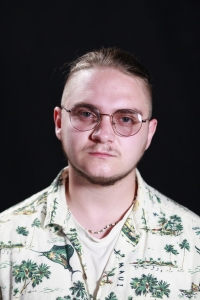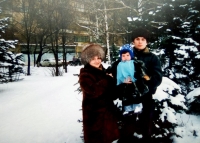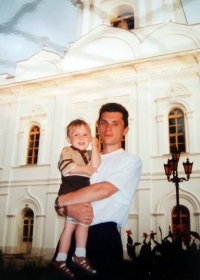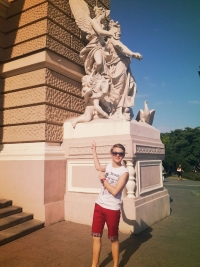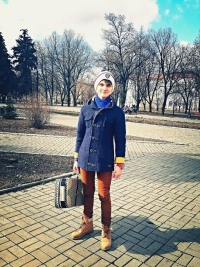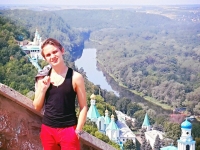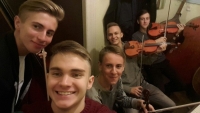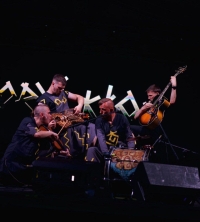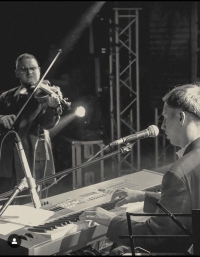"It was summer. Summer, for sure. It was when they had already closed all the roadblocks. I mean, they put up these roadblocks and that's all, they almost completely stopped people from moving. We had a hard time leaving. It was not a question of where to go. It was a question of whether we would make it at all. It was already time for BM-21 Grad to start working, and there was shelling and explosions everywhere. They [the occupation administration] sent an SMS to your phone saying "there will be shelling in this and that district" (in Russian). Everyone flees to the city centre, and it is the city centre that is being shelled. I mean, not the district mentioned in the message, but the one everyone fled to. My music school friend's mother died that way, I think. It is very unpleasant to remember. I don't remember the month. I think it was... midsummer or something like that. It was so hot outside. We were all crammed into these little buses. We took our things. We hurried to get ready. Just the essentials. We could only take what fit in two suitcases. And we were off to the city centre. The departure point was one, on a central square. At 7 in the morning. There were three buses, and "there will be no more", they said. That's all. The next day — maybe something, but not today, maybe tomorrow, because no one knows what will happen, events unfolded very quickly... My mum and dad rushed me onto the bus. Mum panicked a lot. Dad was calm. The bus started. A roadblock. They took all the older men out and said, ‘Dig! Dig the trenches!’ They just gave them shovels and some bags of cement with sand. And the men started digging. Then the shelling started. All the men were rushed back to the bus. And that's all. Nobody cared anymore. Nobody looked, everybody hid. And then the bus driver said, ‘Let's go, quickly.’ And that's all. He stepped on the accelerator and the bus took off. That's how we left. There were three buses. One of them turned off somewhere, I don't remember exactly where. The second bus went to Mariupol, I think it went that way, towards the sea <...> but it didn't make it. And our bus... we went to Krasno... I can't remember if it was Krasnodar or Krasnoarmieysk. Something "Krasno." We were going there. A woman started to give birth on the bus: the heat and the stress were horrible. Somehow, by the skin of our teeth, we got there. And then, after getting off the bus in that Krasnoarmieysk, this question: "What are we going to do? Where to go?" Thank God we made it, but what to do next — we did not know. We had some money, some savings that we had been putting off for repairs. We could go somewhere else. But we had to think. <...> The summer started and it was a year of so much moving, waiting. It was the whole year [2014]". — "How did you know the war had started?" — "I mean, when we were standing on the balcony with my father, they started to move... building materials and so on... And then there was just a huge column of tanks passing by, and that was it... The paving stones cracked, like that. The second time was when there was an alarm. Well. The alarm was not announced, there were messages like "there will be shelling, be careful." How is that possible, there was no alarm in the city. It was a nightmare. Everyone went underground and waited. All the bomb shelters were closed. There was a gym, you could not get past it. And there were these guys with guns, these DNR soldiers [from the "DNR", the occupying regime in the Donetsk region], and they were shooting all the lamps, these new ones for traffic. They just shoot from their Kalashnikovs — ta-ta-ta-ta, burst fire. It was like that. What was that? That's when I realised it wasn't a game. Even with all the shelling, it was clear that this was a war. Then... <...> We stopped short. We stayed for four or five days after that incident with the underground. And that's it. We realised that it was impossible, nothing was working... ATB... Oh no, Amstor [a supermarket] was closed forever because it was completely looted. We had to flee somewhere."

